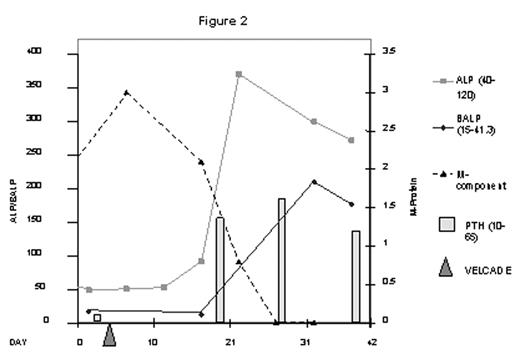Abstract
The molecular targets of anti-tumor activity elicited by VELCADE may vary among tumor types. The extent to which each target is critical to the inhibition of tumor growth may also differ. In MM patients, we have previously reported a statistical correlation between the elevation of total alkaline phosphatase (ALP) levels (in the absence of liver function abnormalities) and response to combination treatment with VELCADE, Thalidomide, and Dexamethasone (
Zangari, et al, Blood, 2003:102(11):687a
). Changes in ALP levels have recently been analyzed in patients treated with single agent VELCADE on the Millennium-sponsored trial 025 evaluating sequential multi-chemistry profiles obtained from a total of 182 patients with relapsed/refractory MM. Median age was 58 years and 61% were male. Patients were divided into two groups based on their myeloma response. Group A included patients with no response and/or progressive disease following VELCADE therapy. Group B included patients who achieved ≥ 25% paraprotein reduction. Elevation of ALP, in the absence of liver function abnormalities, was observed exclusively in responding patients (Group B). Using the Wilcoxon Rank-Sum test, the difference in elevation of ALP after completion of two cycles of VELCADE between the two groups was statistically significant (P=0.02) [Figure1]. In an attempt to determine the source of the ALP increases, prospective serial measurements of ALP, bone-specific alkaline phosphatase (BALP) and intact parathyroid hormone (PTH) were obtained in three MM patients treated with single agent VELCADE at our institution. The rise in ALP activity was associated with rapid paraprotein response and to a parallel increase in BALP and PTH levels, indicating increased osteoblastic activity [Figure2]. Our experience represents the first clinical evidence in MM patients that VELCADE promotes osteoblastic activity, which typically correlates with anti-myeloma activity.Author notes
Corresponding author
2005, The American Society of Hematology
2004



This feature is available to Subscribers Only
Sign In or Create an Account Close Modal